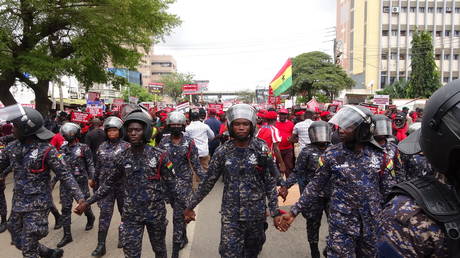Africa
Numerous people in Ghana protest the economic crisis

Demonstrators are calling for the head of the central bank to quit for allegedly pushing the nation into economic hardship.
To demand the resignation of central bank governor Ernest Addison and his appointees, whose financial policies they hold responsible for the nation’s economic issues, thousands of demonstrators and pressure groups marched in Accra, the capital of Ghana, on Tuesday.
The leadership of the Bank of Ghana (BoG) was accused of overseeing money losses, bad administration, and driving inflation up to 40% by the opposition National Democratic Congress (NDC) and its allies, who organised the “OccupyBoGProtest” protests.
“Who’s our problem if the entire nation needs $1 billion from the IMF annually for three years to fix our issue, but Addison can oversee the loss of $5 billion in one year?” Reporters were told during the protest by Samuel Nartey George, a member of the minority in the parliament.
In an interview with the official newspaper Daily Graphic, former BoG staffer Komevor Tettegah also criticised the central bank, alleging that it had experienced its first-ever “big loss of over 60 billion cedis” as a result of poor management.
A record loss of 60.8 billion cedis ($5.3 billion), mostly as a result of debt restructuring, was disclosed by Ghana’s central bank in July.
The West African nation, which is a significant producer of both gold and cocoa, and banks came to an agreement in June to restructure 15 billion cedis’ worth of locally issued US dollar bonds and cocoa bills.
As part of a three-year, $3 billion loan programme intended to address economic issues, one of the requirements the government must meet in order to receive funds from the International Monetary Fund (IMF) is the debt restructuring.
Addison, the governor of the BoG since 2017, who has two years left on his term, declared last month that the three-year IMF extended credit facility’s policy mix was starting to show promising outcomes. He asserted that the Ghanaian economy was experiencing a robust recovery, marked by a stable currency rate, decreasing inflation, and rising foreign exchange reserves.
The nation’s “deteriorating” state, marked by unemployment and poverty, worried demonstrators on Tuesday, but the protest’s organisers, who had failed to deliver a petition to the governor, vowed to keep trying until they were successful.
“Governor Addison has chosen to disrespect us by claiming that he is meeting with the International Monetary Fund (IMF) when he could have given us 10 minutes of his time,” said Casiel Ato Forson, the leader of the NDC minority.
